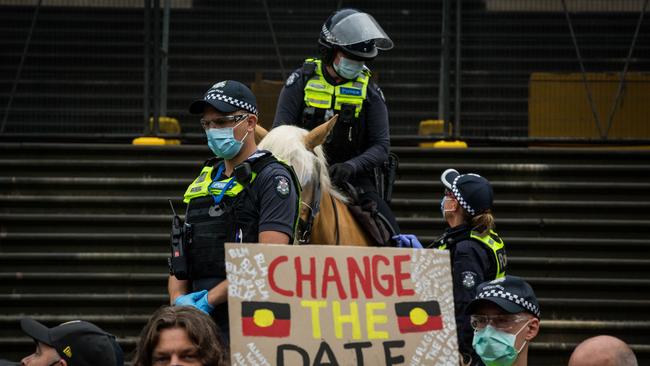
That suited the protesters, whose aim was to incite rather than inform. And in its own way, it also suited those they outraged, who could go away with all their views confirmed.
Lost in the process was any sense of the harm being done to historical accuracy and to our collective understanding of this country’s past, present and future.
After all, what we celebrate on Australia Day is not a polity that emerged, like Botticelli’s Venus, fully and perfectly formed, dispensing justice to all and undue suffering to none; no such entity has ever existed on this earth. Rather, the historically significant event was the birth — in the unlikely form of a convict colony — of what would mature into an open society that could, through democratic processes, learn from its failings and build on its achievements.
To say that is not to deny that many were excluded from its benefits and protections. Yet it is also undeniable that the circle of belonging was progressively extended, securing, however unevenly, an ever fuller measure of political and civic equality. Social progress and material improvement therefore went largely peacefully together, which, in a world strewn with violence and hatred, is so remarkable a blessing as to richly deserve being feted.
Unfortunately, history’s fractured terrain readily lends itself to being transformed into a battleground.
And the scope for mischief is all the greater because modern life is consumed by what Friedrich Nietzsche called a “malignant historical fever” that makes us seek in the past the sticks with which to beat each other senseless in the present.
Warning, in his Untimely Meditations, against the temptations of “critical” history, which takes as its subject matter solely those elements of a country’s past that its practitioners find unjust and inhuman, Nietzsche noted that its inevitable conclusion is that “all that exists is worthy of perishing”. Capable of demolishing but not of building, its one-sided perspective fosters resentment and ill-directed anger, while leaving the task of “creation enfeebled and discouraged”.
But the damage wreaked by the rhetoric of “invasion” and “genocide” goes beyond the misleading portrait it paints of Australia’s development. Rather, it has cemented a “sorry” culture that is morally and politically impoverishing.
It is, to begin with, morally scarcely less wrong to profess guilt about something one has not done than to proclaim innocence of faults one has actually committed: both cheapen the currency of moral accountability. Today’s Australians bear no more blame for the sins of generations long gone than they deserve praise for their accomplishments. And as much as we should lament past failings, the future will judge us on whether we address the woes that now afflict us, not those of previous centuries.
To believe otherwise risks replacing a clear-sighted analysis of problems with displays of contrition that are as ritualistic as they are ineffective.
At the same time, the “sorry” culture perpetuates a sense of victimhood that gives European settlement no credit for the enormous gains it has conferred.
The Enlightenment attitudes that came with the First Fleet took it as a matter of course that humanity could, by “daring to know”, lift itself by its bootstraps; and whatever their costs, the miracles of economic, social and technical progress those attitudes unleashed were and remain truly miraculous. To deny that they make it possible for all Australians, including Australians of Indigenous descent, to live longer, fuller and safer lives than ever before is to dispute a truth so self-evident as to be irrefutable. The tragedy of this country’s Indigenous communities is not that they have been excessively exposed to the way of life the settlers forged, with its manifold benefits; it is that our policies previously too often forced, and now too often encourage, those communities to remain on its fringes.

Ultimately, as Hegel — who thought about these concepts more deeply than anyone else — taught us, recognition and reconciliation can be based only on respect. And with the root of “respect” being “to look back”, staring someone in the eye, so that they, too, are seeing into the windows of one’s soul, the only genuine form of respect is mutual, allowing a reconciliation that is neither resignation nor consolation but a “life-enhancing” affirmation of joint responsibility.
That hardly means ignoring division, conflict and opposition, nor can it ever be a question of believing that everything is, or could be, wonderful. “The state,” said Hegel, “is not a work of art; it exists in the world, and hence in the sphere of arbitrariness, contingency and error.” But no failings can be overcome unless one accepts “reason as the rose in the cross of the present”, approaching reality with confidence in the scope rational deliberation creates for progress.
None of that will placate the activists, any more than would changing the date on which we celebrate the Australian achievement. Their unshakeable premise is that this country is rotten to its core; it would be better, some of them clearly believe, if the millions of settlers who built this continent had left it to the drifting sands.
Rather than giving thanks for contemporary Australia’s gifts, they therefore view our national day, whatever its date might be, as an opportunity to stage a morality play — pitting good against evil, victim against executioner — in which they are the undisputed stars, with a plot that appeals to those who (while benefiting handsomely from the country’s success) enjoy indulging in guilt for its own sake.
In a society in which more and more of life is played out in the public gaze, it is hard to think of a surer way to claim a place, however fleeting, in the ruthless competition for attention. But it is also hard to think of a surer way of undermining the mutual respect that is needed if many controversial issues, including the so-called voice to parliament, are to be properly debated, as they need to be in the months ahead.
Observing the world as it stands, it is difficult to conjecture a bestiality, a lunacy of oppression or a sudden devastation that would not be credible and that could not readily become a fact. Amazingly, the culture, connections and institutions that the First Fleet brought on its perilous journey not only spared us those calamities but set the foundations for a future of freedom and prosperity.
To every year remember that fleet’s arrival, and mark it by welcoming new citizens who have come under immeasurably easier conditions, is the least we can do in grateful return.







It was predictable, but nonetheless a pity, that the row over Australia Day would prove to be all heat, no light.